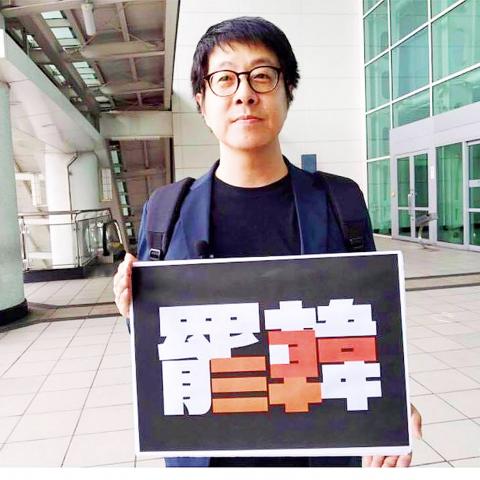A petition to recall Kaohsiung Mayor Han Kuo-yu (韓國瑜) has passed the first signature threshold and would soon proceed to the second stage, Wecare Kaohsiung founder Aaron Yin (尹立) said.
Han, the Chinese Nationalist Party’s (KMT) presidential candidate, is competing in the Jan. 11 election against President Tsai Ing-wen (蔡英文) of the Democratic Progressive Party and People’s First Party Chairman James Soong (宋楚瑜).
The organization would file a recall request with the Central Election Commission on Thursday, as it has collected more than 22,800 signatures required in the initial stage of the petition, Yin said.

Photo copied by Huang Chia-lin, Taipei Times
In the second stage, about 228,000 signatures would be needed for the commission to hold a vote to recall Han, said Chang Po-yang (張博洋), a representative of the Taiwan Statebuilding Party, which is also one of the initiators of the petition.
The groups want to recall Han because they say that he launched a presidential bid less than six months into his mayoral term and has not been paying any attention to the Kaohsiung City Government, said Citizens Mowing Action, another petitioner.
Han made “bizarre” and “impractical” promises during his mayoral campaign, has been constantly tripped up by gaffes and missteps, and is an “incompetent” and “absentee” mayor, it said.
However, a requirement that specific forms be used in the second stage of signature collection as well as a requirement that they be submitted within 60 days after the approval of the initial stage pose a challenge, Chang said.
That means the petitioners need to have the commission verify at least 22,800 signatures that had been collected and then obtain another 228,000 in less than two months, Chang said.
Under the Civil Servants Election and Recall Act (公職人員選舉罷免法), recalling an elected official is a three-stage process, in which petitioners must first submit a recall proposal bearing the signatures of at least 1 percent of the voters in an electoral district.
In the case of Han, that amounts to at least 22,800 of the city’s 2.28 million eligible voters for the first stage. The threshold rises to 10 percent of the electorate in the second stage.
The final stage is a recall vote, in which at least 25 percent of the electorate — about 570,000 people in this case — must participate for the results to be valid. An official would be recalled if a majority of the electorate votes in favor of a recall.
If the petition passes all the thresholds, a recall vote might be held in late May, Chang said.

A small number of Taiwanese this year lost their citizenship rights after traveling in China and obtaining a one-time Chinese passport to cross the border into Russia, a source said today. The people signed up through Chinese travel agencies for tours of neighboring Russia with companies claiming they could obtain Russian visas and fast-track border clearance, the source said on condition of anonymity. The travelers were actually issued one-time-use Chinese passports, they said. Taiwanese are prohibited from holding a Chinese passport or household registration. If found to have a Chinese ID, they may lose their resident status under Article 9-1

Taiwanese were praised for their composure after a video filmed by Taiwanese tourists capturing the moment a magnitude 7.5 earthquake struck Japan’s Aomori Prefecture went viral on social media. The video shows a hotel room shaking violently amid Monday’s quake, with objects falling to the ground. Two Taiwanese began filming with their mobile phones, while two others held the sides of a TV to prevent it from falling. When the shaking stopped, the pair calmly took down the TV and laid it flat on a tatami mat, the video shows. The video also captured the group talking about the safety of their companions bathing

PROBLEMATIC APP: Citing more than 1,000 fraud cases, the government is taking the app down for a year, but opposition voices are calling it censorship Chinese Nationalist Party (KMT) Chairwoman Cheng Li-wun (鄭麗文) yesterday decried a government plan to suspend access to Chinese social media platform Xiaohongshu (小紅書) for one year as censorship, while the Presidential Office backed the plan. The Ministry of the Interior on Thursday cited security risks and accusations that the Instagram-like app, known as Rednote in English, had figured in more than 1,700 fraud cases since last year. The company, which has about 3 million users in Taiwan, has not yet responded to requests for comment. “Many people online are already asking ‘How to climb over the firewall to access Xiaohongshu,’” Cheng posted on

A classified Pentagon-produced, multiyear assessment — the Overmatch brief — highlighted unreported Chinese capabilities to destroy US military assets and identified US supply chain choke points, painting a disturbing picture of waning US military might, a New York Times editorial published on Monday said. US Secretary of Defense Pete Hegseth’s comments in November last year that “we lose every time” in Pentagon-conducted war games pitting the US against China further highlighted the uncertainty about the US’ capability to intervene in the event of a Chinese invasion of Taiwan. “It shows the Pentagon’s overreliance on expensive, vulnerable weapons as adversaries field cheap, technologically